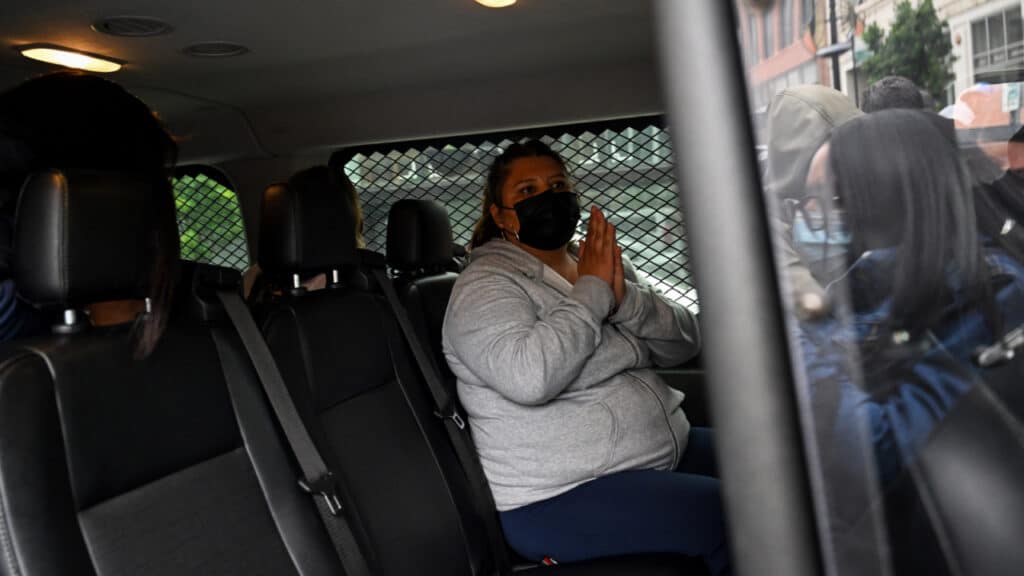
ICE Presence in Courts and Shelters Forces Survivors of Domestic Violence Into Silence
For many immigrant survivors of domestic violence, calling 911 isn’t just about reporting abuse. It could mean losing everything. The fear of Immigration and Customs Enforcement (ICE) showing up has left many trapped in violent homes, weighing their safety against the risk of deportation.
Abusers weaponize immigration status in domestic violence cases
In Louisiana, a woman who says her boyfriend assaulted her is now in detention. According to her mother’s account to Noticias Telemundo, the boyfriend called the police to accuse her and then tipped off ICE about her immigration status.
In Houston, a Salvadoran woman dialed 911 for help in April. Legal records reviewed by the Houston Chronicle show that local police then contacted ICE.
Advocates told Noticias Telemundo that these cases are common. Some abusers use immigration status to control or silence victims. Isabel Martínez of the Tahirih Justice Center explained that women fear “not only will nothing happen to the abuser, but now I will have to be deported, or be detained, or get into trouble if I call the police.”
Fear of ICE silences victims of domestic violence
The fear isn’t new. As early as 2019, the Tahirih Justice Center noted that immigrant women were reluctant to report abuse. But under the Trump administration’s current immigration crackdown, advocates say fear has intensified.
A national survey from the Alliance for Immigrant Survivors released in June found that 76% of immigrant advocates reported victims of domestic violence were afraid to call the police. Half of the advocates surveyed said their clients dropped criminal or civil cases to avoid deportation.
Even hospitals reflect this chilling effect. A study in San Francisco and Oakland found that 19% of domestic violence victims avoided law enforcement for fear of being reported to ICE.
Prosecutors warn abusers go free as cases collapse
The consequences go beyond silence. In New Mexico, First Judicial District Attorney Mary Carmack-Altwies told Source NM that she saw a domestic violence survivor suddenly stop cooperating. The woman had previously accused her partner of abuse. “All of the sudden, now she will not return our calls, return our texts,” Carmack-Altwies said. She believes the woman was afraid of deportation.
The prosecutor said the likely result is that “we have a domestic violence abuser and a child abuser that is going to walk away scot-free.” She added that some defense attorneys have even asked accusers about their citizenship in court as a scare tactic.
ICE’s presence makes domestic violence survivors feel unsafe
The fear extends into courtrooms and shelters. According to USA Today, ICE has increased arrests during immigration court hearings. Some survivors say just walking into court feels dangerous. One of attorney Libby Hasse’s clients in Houston asked: “Am I going to be detained today? Am I going to be separated from my kids?”
Advocates say abusers exploit this fear. Casey Swegman of the Tahirih Justice Center told USA Today that one woman’s abuser threatened her by saying, “Look at the TV, look at what they’re saying, nobody cares about you.” The implication: if she reported him, ICE could deport her.
Shelters also report fewer women coming forward. The director of a domestic violence shelter in El Paso told USA Today she has seen a 25% drop since ICE was allowed back into shelters.
When silence becomes deadly
The choice to stay quiet can be fatal. Studies from the CDC and National Institutes of Health show that over half of intimate partner homicides are preceded by prior violence. For women, the figure rises to 75%.
EL PAÍS reported that a Salvadoran woman in Houston faced continued harassment from her ex despite a restraining order. When she called the police in April, officers warned her the report would go to ICE and told her not to file in person. “If he were to hurt me again, I don’t think I could report it, because that’s where my story would end,” she said.
Bonnie Escobar, director of Enlace Comunitario in New Mexico, said ICE raids have shaken communities. Her support group for survivors usually draws 20 women. After two raids at a local Walmart, only five showed up. “We’ve seen the chilling effects from just two raids,” she told EL PAÍS.
The long road to protection through U visas and VAWA
Some legal protections exist, but they come with long waits. Victims of violent crimes who cooperate with authorities can apply for a U visa. According to USA Today, the backlog means applicants often wait 10 to 20 years.
Others file petitions under the Violence Against Women Act (VAWA), which allows survivors to continue immigration processes without the abuser’s involvement. U.S. Citizenship and Immigration Services reported 35,917 VAWA petitions in 2024.
But even with these options, many survivors live in fear. As Martínez of the Tahirih Justice Center put it, the first step is breaking the psychological control. “You don’t deserve abuse,” she said.




